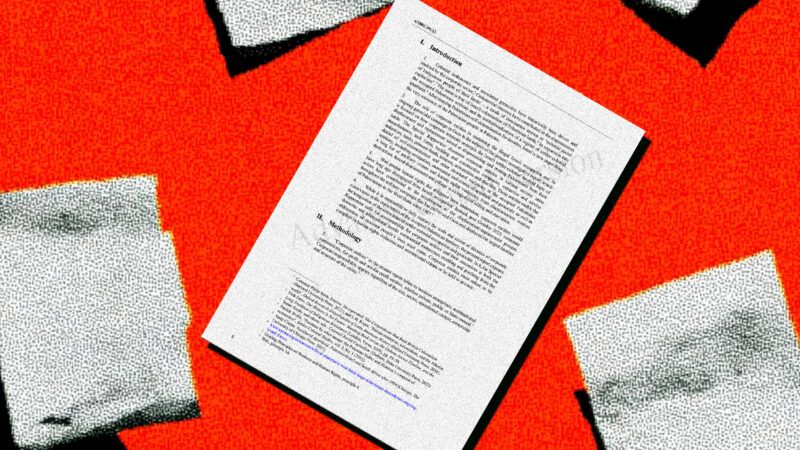The U.S. Government Doesn't Want You To Read This Report on Israel's Business Deals
Whether or not one accepts the report's characterization of Israel's actions, the report itself is an interesting read on the economics of war.

The U.S. government doesn't want you to read what Francesca Albanese, the U.N. special rapporteur on the occupied Palestinian territories, has to say. In July 2025, the State Department announced that it was going to freeze her assets for her "lawfare that targets U.S. and Israeli persons."
Albanese, the State Department press release noted, had "directly engaged with the International Criminal Court (ICC)" at The Hague "in efforts to investigate, arrest, detain, or prosecute nationals of the United States or Israel, without the consent of those two countries." And she had "recently escalated this effort by writing threatening letters to dozens of entities worldwide, including major American companies across finance, technology, defense, energy, and hospitality, making extreme and unfounded accusations."
A few weeks earlier, Albanese had submitted her report to the U.N. Human Rights Council, "From Economy of Occupation to Economy of Genocide." It accuses several global companies of profiting "from the Israeli economy of illegal occupation, apartheid and now genocide," including Lockheed Martin, Microsoft, Palantir, Caterpillar, and even Booking.com. (The report also mentions that companies have been asked for comment, which appears to be the "threatening letters" referred to by the State Department.)
Whether or not one accepts Albanese's characterization of Israel's actions, the report itself is an interesting read on the economics of war. The report details how some firms profit directly from providing the state with the tools to inflict violence while others take advantage of the state's monopoly on violence to grab a monopoly on resources. Albanese calls for international sanctions, legal action, and consumer boycotts aimed at changing these companies' behavior.
The U.S. government's attempts to stop the report from being published in the first place make it especially worth reading. Politicians have long wanted to erode Americans' right to vote with their wallets, and they've used boycotts of Israel as a test case to introduce wide-ranging anti-boycott laws. By accusing the United Nations of "lawfare" for simply printing a report, the government is attacking the right of consumers and investors to hear information that lets them make politically conscious decisions.
The Palestinian rights movement has made boycotts a central pillar of its activism, but the actual choice of targets has often been sloppy and incoherent. Activists have gone after Coca-Cola and Pepsi as vague symbols of America and Starbucks over a union dispute that tangentially involved Palestinian symbolism. The infamous protests at Columbia University focused on cutting indirect ties to weapons companies.
Albanese is more systematic about what she considers complicity in the war. Her report lists 45 firms in three categories of complicity, from most to least direct. "Destruction" refers to providers of military equipment and surveillance tech to the Israeli army. "Replacement" refers to companies that deal with land and natural resources taken through armed conquest. "Enablers" refers to firms that finance these activities, research universities that work with the Israeli military industry, and others.
Albanese points the finger at companies that operate within the zones of military rule which the report alleges were turned "into a captive market" by the Oslo Accords of the 1990s, including agribusinesses, construction and quarry operators, realtors, and travel agencies.
Ultimately, Albanese's recommendations to prosecute involved companies and pay reparations to Palestinians are measures that a United Nations researcher has no authority to prescribe. The powerlessness of her job, in fact, is what makes the State Department's accusation of "lawfare" so laughable. Albanese simply wrote about a set of facts and her thoughts on the moral implications. It's up to other people to read the report and decide for themselves whether to take action—which is exactly what the government wants to avoid.
